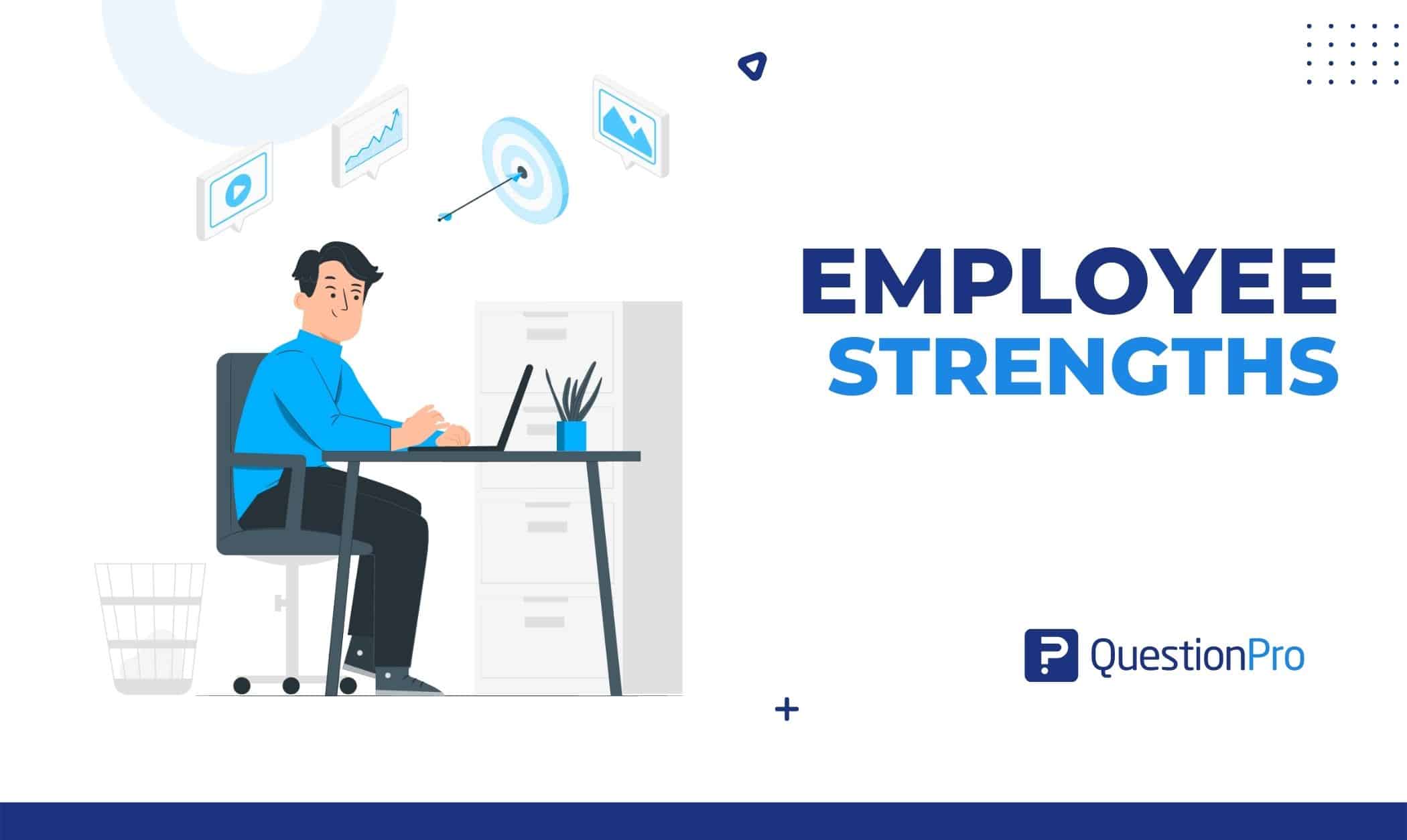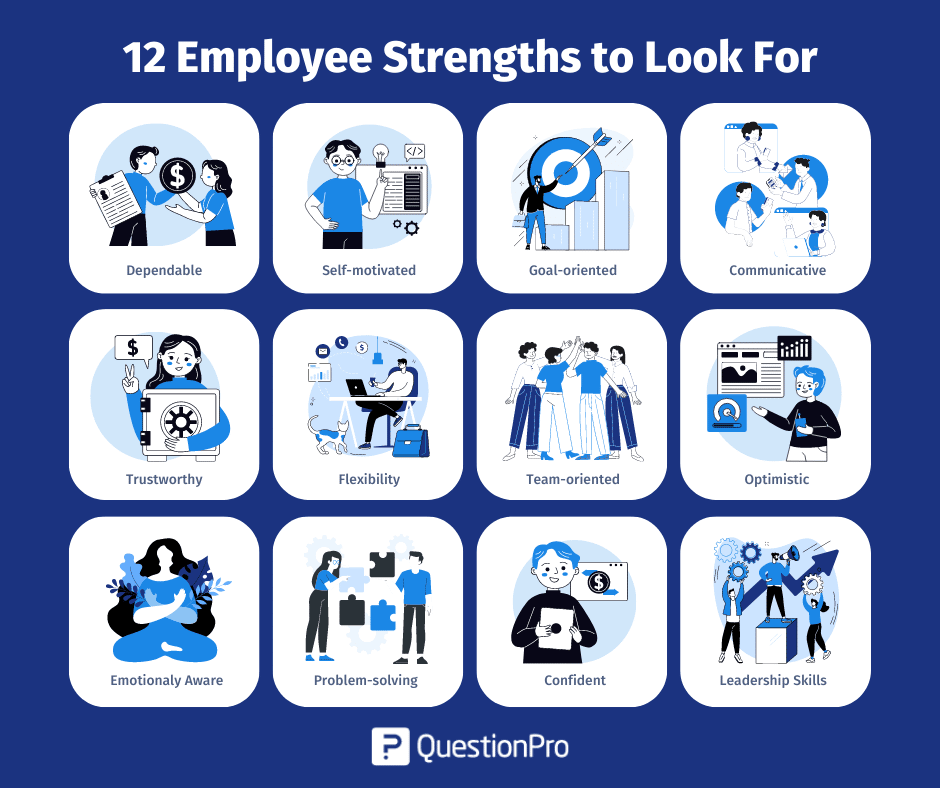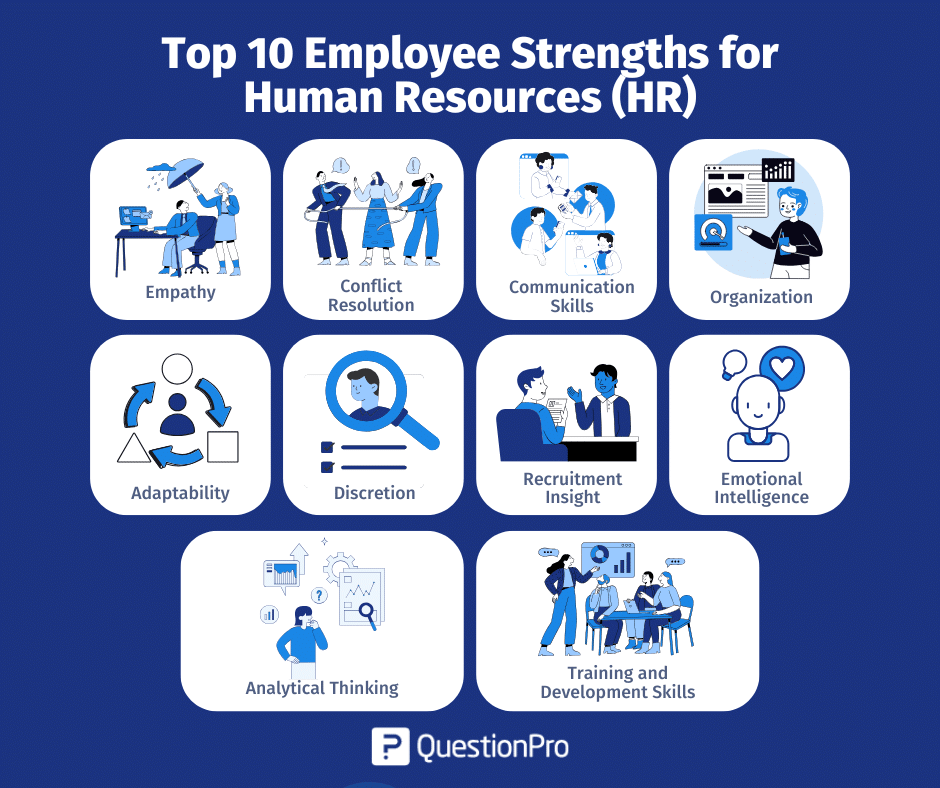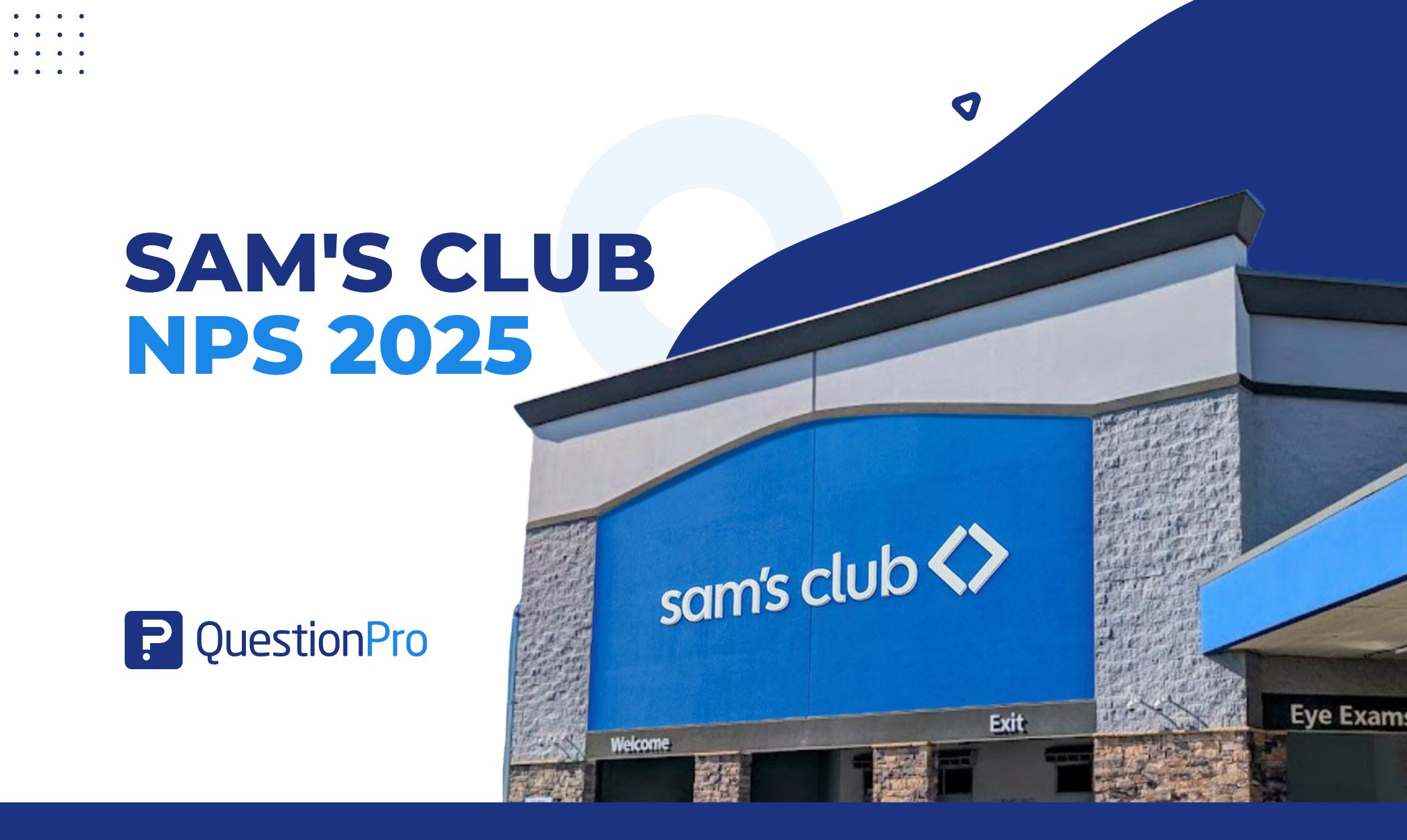
A company’s quality depends on its employees. They are the foundation that supports business operations. Analyzing employee strengths is an essential component in achieving company goals and milestones.
A diverse workforce bring together people with different skills and abilities that can display optimal results. As a manager, you must know their strengths and weaknesses to help them improve.
The main goal should be to ensure that employees are evaluated on time so the organization can succeed in the long run.
Companies need to identify and leverage these strengths to make the company stronger. This article will discuss the strengths of employees that a good leader should look out for.
What are Employee Strengths?
Employee strengths are the unique skills, abilities, and qualities each individual brings to the workplace. These strengths can significantly differ from person to person and can include any skill, from excellent communication abilities to a knack for problem-solving.
When a company focuses on identifying and utilizing each employee’s strengths, it creates a work environment that allows and promotes growth, productivity, and creativity among its team members.
Recognize and implement employee strengths to build a diverse, well-rounded team better equipped to handle challenges and adapt to change. Promote a positive and supportive workplace culture where employees feel valued and empowered.
Employees who know their strengths and weaknesses can learn from their mistakes and improve their overall skill set to become experts in their work field. These employees can grow into great leaders who can help the next generation become a great workforce.
12 Employee Strengths Your Company Needs
When employees know how to use their strengths to make them more efficient and improve their performance, they can reach their goals and employee expectations.

Here is a list of employee strengths to focus on that can fit every company. These are the essentials:
1. Dependable
When problems arise, dependable employees take responsibility. They are trustworthy and devoted workers. Your coworkers can come to you for advice or support if you’re a reliable employee because you’re prompt and consistently meet deadlines.
As a dependable employee, you consistently deliver high-quality work. This strength allows you to build enduring professional connections.
2. Self-motivated
Self-motivated employees do a quality job without supervision. Supervisors are aware of your job commitment and this strength. It is a helpful skill because it lets you stay focused on your task and generate high-caliber work.
3. Goal-oriented
Employees who want to do an excellent job focus on the overall goal or aim. This goal for employees is essential because it helps increase productivity and helps everyone on your team work toward the same purpose. You also do things with a bigger plan and know what you want to accomplish.
4. Communicative
Communication is one of the employee strengths and is vital for the betterment of your organization. When you work with people from different jobs and with different personalities, you need to be able to talk to them. It makes it easier to share information with other professionals, as well as with customers and clients.
Your ability to communicate concisely and effectively reduces disagreements and misunderstandings.
For example, when writing emails, you need good communication skills to ensure that your tone and message are correct.
5. Trustworthy
Honest and reliable employees are trustworthy. Trustworthy employees accept responsibility for their actions and regret making mistakes. Additionally, you can access private data without supervision.
Because trustworthy employees may work autonomously and be positive role models for their peers, employers value them highly.
6. Flexibility
Flexibility is an essential employee strength. Employees with flexibility respond to changes at work quickly. Flexibility helps you deal with problems more calmly and with higher morale. Additionally, you keep a positive attitude and pick up new skills rapidly.
By being adaptable to employee expectations, you serve as a leader and an example to others. Flexibility boosts productivity by enabling you to learn new techniques and abilities.
7. Team-oriented
Employees who value teamwork enjoy working in teams and with their coworkers. You take on the role of group leader if you are team-oriented. You give equal attention to the job you must do for your and your teammates’ success. With a team-first mentality, you also think about your division’s and project’s success.
8. Optimistic
Optimism is a good trait because it lets you keep a positive attitude even when things are hard. It makes you more motivated as a whole and makes you more productive. You can show your coworkers how to do the same if you have a positive attitude at work.
It can also improve the company culture and make your colleagues feel more welcome at work.
9. Emotional awareness
Emotionally aware employees pay attention to body language and other nonverbal signals to ensure their workmates’ comfort. They know how their actions affect their workmates’ feelings. If you know how you feel, you can understand how others think.
You can help improve your relationships and those around you by being understanding and helpful.
10. Problem-solving
To be a problem solver, you must know how to find solutions to challenging situations. Problem-solving skills let you analyze issues as they come up. It saves time and money for the department and the company by allowing you to solve problems quickly.
11. Confident
When an employee is confident in their job, they perform well. They stay focused and pay attention to every little thing they need to do to reach their goals. The most important thing here is that they know a lot about their work field and deeply understand it.
They set rules that other employees try to follow. The level of confidence that these employees show affects other people as well. So, it creates a place where everyone tries their best, which makes the organization more productive.
12. Leadership Skills
Leadership that works well motivates other people to do better. But it is not easy. You need the right skills to motivate people to work hard and promote good work ethics in the organization. So, leadership is seen as one of your organization’s most crucial employee strengths.
Employees with good leadership skills can inspire others, have a vision, make good plans, and develop new ideas in a competitive market. As a leader, you can help them and the rest of the team reach the company’s goals without sacrificing your own.

Top 10 Employee Strengths for Human Resources (HR)
The HR department manages the employee lifecycle, from recruitment to retention, making these strengths essential:
- Empathy: Understanding employees’ emotions and perspectives builds trust.
Example: An empathetic HR manager might mediate a workplace conflict by actively listening to both parties and finding a mutually beneficial solution. - Conflict Resolution: Effectively resolving disputes ensures a harmonious work environment.
Example: An HR representative resolving a scheduling dispute between departments. - Communication Skills: Clear communication prevents misunderstandings and boosts morale.
Example: An HR specialist explaining complex benefits options during an onboarding session. - Organization: Efficiently managing multiple HR processes, such as payroll and hiring.
Example: Coordinating interviews for multiple candidates in a tight timeframe. - Adaptability: Quickly adjusting to changes in labor laws or company policies.
Example: Revising contracts to comply with new minimum wage laws. - Discretion: Handling sensitive information with confidentiality.
Example: Keeping salary discussions private while ensuring fairness. - Recruitment Insight: Identifying candidates who align with company culture and goals.
Example: Hiring a data analyst with specific experience in predictive modeling. - Emotional Intelligence: Building positive relationships across the organization.
Example: Supporting employees during personal or professional challenges. - Analytical Thinking: Using data to make decisions about retention and engagement.
Example: Analyzing exit interview data to reduce turnover rates. - Training and Development Skills: Implementing upskilling programs for employees.
Example: Organizing workshops on emerging technologies for IT staff.
Top 10 Employee Strengths for Marketing
Marketing is vital for promoting the company’s brand and offerings. These strengths drive impactful campaigns:
- Creativity: Generating innovative ideas for campaigns.
Example: Developing a unique social media challenge that goes viral. - Data Analysis: Turning raw data into actionable insights.
Example: Analyzing website traffic to optimize digital ad placement. - Storytelling: Engaging audiences through compelling narratives.
Example: Crafting an emotional customer success story for a product launch. - Adaptability: Staying ahead of trends and changing strategies accordingly.
Example: Shifting focus to TikTok marketing after identifying audience preferences. - Collaboration: Working closely with design, sales, and content teams.
Example: Aligning the design team’s visuals with the sales team’s messaging. - Digital Savviness: Mastering tools like Google Analytics or SEO platforms.
Example: Using keyword data to improve blog content visibility. - Strategic Thinking: Allocating budgets for maximum ROI.
Example: Prioritizing pay-per-click ads that consistently outperform organic posts. - Customer-Centricity: Understanding and serving audience needs.
Example: Running surveys to refine product features based on user feedback. - Project Management: Keeping campaigns on schedule and within budget.
Example: Launching a holiday campaign across platforms by the deadline. - Attention to Detail: Ensuring all deliverables maintain brand consistency.
Example: Catching a logo placement error in a digital ad before launch.
Top 10 Employee Strengths for IT/Technology
The IT department ensures technological efficiency and innovation, making these strengths crucial:
- Technical Expertise: Mastering programming, systems, or hardware.
Example: An IT engineer developing an efficient CRM system. - Problem-Solving: Diagnosing and resolving tech issues.
Example: Fixing a server outage under tight deadlines. - Analytical Thinking: Interpreting system performance data.
Example: Analyzing logs to identify security vulnerabilities. - Adaptability: Keeping pace with rapidly evolving tech.
Example: Transitioning the team to a cloud-based infrastructure. - Collaboration: Partnering with non-technical teams to solve problems.
Example: Explaining cybersecurity practices to the HR department. - Attention to Detail: Preventing errors during system implementation.
Example: Double-checking software compatibility before deployment. - Cybersecurity Awareness: Ensuring organizational data safety.
Example: Implementing multi-factor authentication to prevent breaches. - Project Management: Leading IT upgrades effectively.
Example: Overseeing the rollout of a company-wide software update. - Curiosity: Staying informed about emerging technologies.
Example: Exploring AI tools to automate mundane tasks. - Customer Support: Translating complex issues for non-tech-savvy users.
Example: Helping employees troubleshoot software via simple instructions.
The Importance of Employee Strengths in the Workplace
Understanding the different types of employee strengths is crucial for creating a successful and productive workplace. When you hire employees, you want to ensure they have the right skills and strengths to complete the tasks you assign to them.
For example, some employees may have strong communication skills, while others may be particularly good at problem-solving or critical thinking. By identifying and leveraging each employee’s strengths, you can create a better-equipped team to handle various challenges and work more efficiently.
Additionally, investing in your employees’ strengths can help promote employee engagement and job satisfaction in their roles. Employees who feel their skills and contributions are valued are more likely to be motivated and committed to their work.
Utilizing the different types of employee strengths can lead to a more effective and harmonious workplace and, ultimately, remarkable company success.
Conclusion
To determine if an employee is a good fit for your organization, it is essential to know their strengths. Their roles and responsibilities will depend on their skills, knowledge, and ability to work well with others.
During job interviews, you can determine if a candidate has the right interpersonal and people skills to ensure you’re hiring the right person.
When you have employees who can bring out the best in themselves and use their strengths at work, reaching your goals and objectives becomes easier over time.
QuestionPro Workforce will help you to manage your employees’ strengths. It explains your data, employee demographics, and habits. Learn how to gather regular employee feedback and benefit your organization with QuestionPro. Start today for free!







